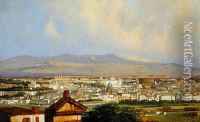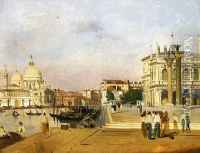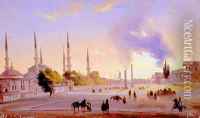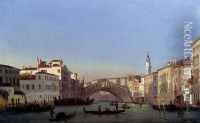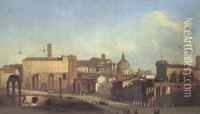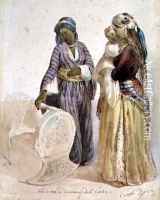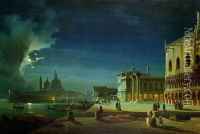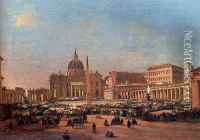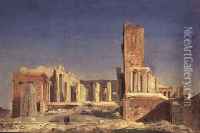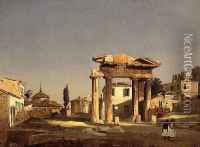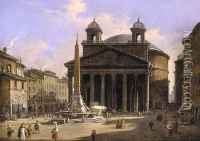Ippolito Caffi Paintings
Ippolito Caffi was an Italian painter known for his atmospheric landscapes and cityscapes imbued with a poetic and often patriotic sentiment. Born on October 16, 1809, in Belluno, a small town in the Veneto region of Italy, Caffi showed an early interest in art and was encouraged to pursue his passion. He initially studied at the Accademia di Belle Arti in Venice before moving to Rome in 1832, where he was deeply influenced by the work of the vedutisti, painters specializing in vedute, or detailed large-scale representations of cityscapes and landscapes.
Caffi's early works were primarily focused on historical subjects and traditional landscapes. However, as he traveled extensively throughout the Mediterranean, his repertoire expanded to include vivid portrayals of city life and famous monuments, capturing the unique light and atmosphere of each location. His travels took him to Greece, Turkey, Egypt, and even as far as Persia, reflecting a 19th-century European fascination with the exotic and the picturesque.
His style was characterized by a fine attention to light and atmospheric effects, which he used to create romantic and often dramatic scenes. This was particularly evident in his depictions of Venice, where he returned periodically and which he portrayed in various conditions of light and weather, showcasing the city's unique architecture and its interplay with water.
Caffi was also involved in the political movements of his time. He was a supporter of the Risorgimento, the movement for Italian unification, and his art occasionally reflected his patriotic fervor. Unfortunately, his political activities sometimes overshadowed his artistic career, leading to periods of difficulty.
Tragically, Ippolito Caffi's life came to an abrupt end when he died on July 13, 1866, during the Battle of Lissa, aboard the Italian battleship Re d'Italia. He was there to document a naval engagement during the Third Italian War of Independence, thus combining his patriotic spirit with his artistic endeavor. His death marked the loss of a unique talent who managed to capture the beauty of the Mediterranean world and the aspirations of a nation seeking its identity.

